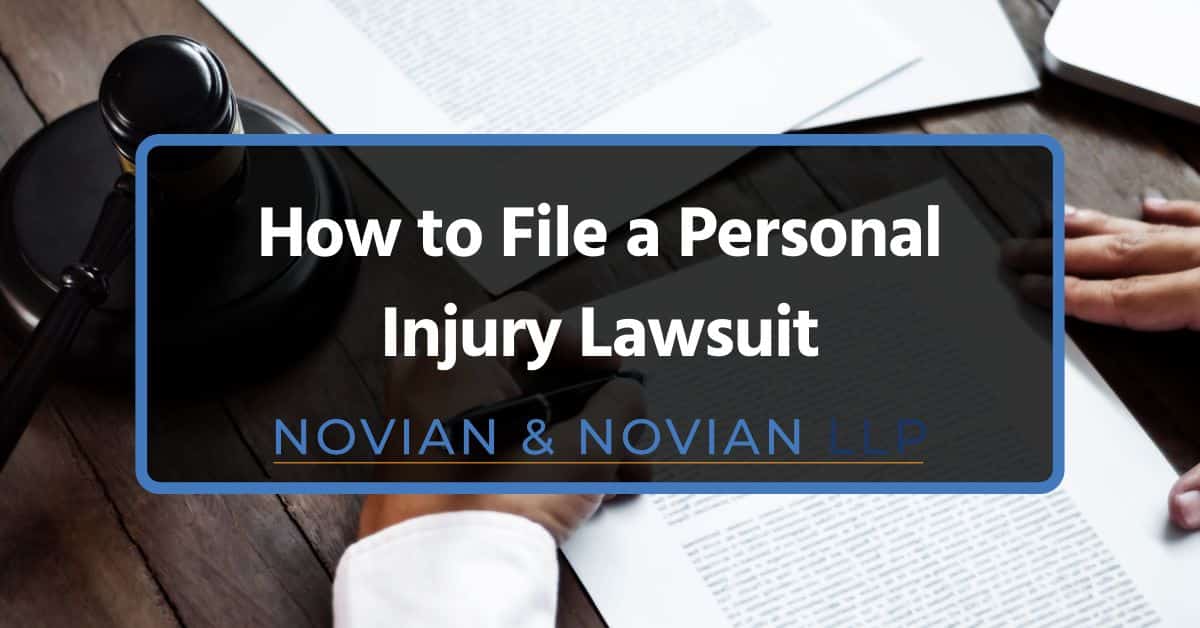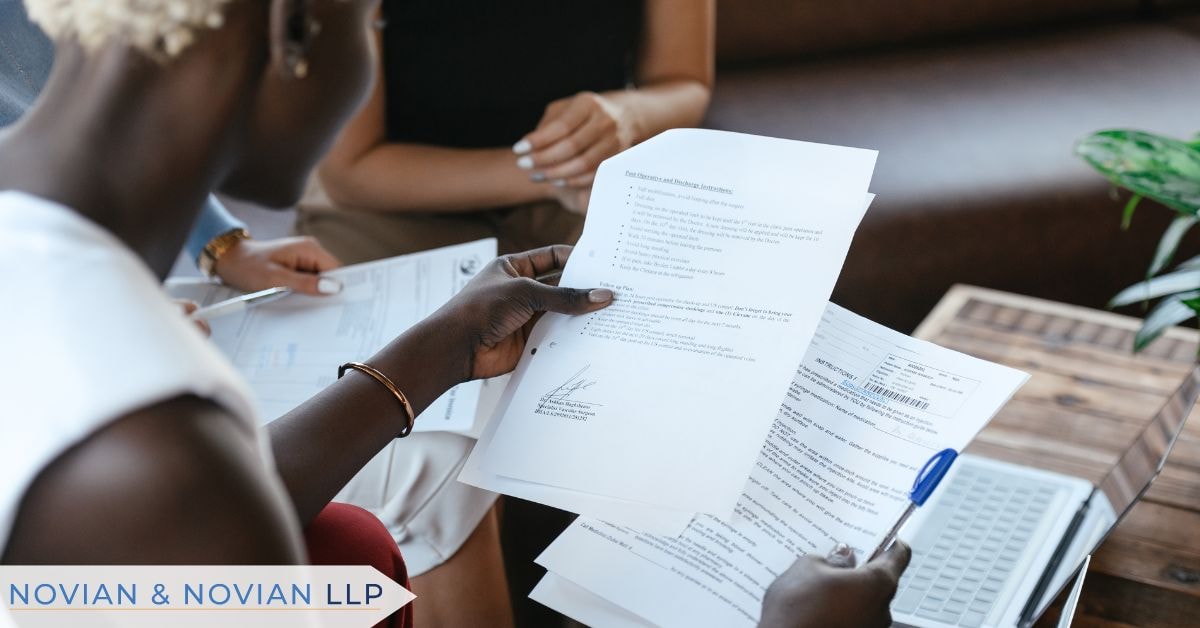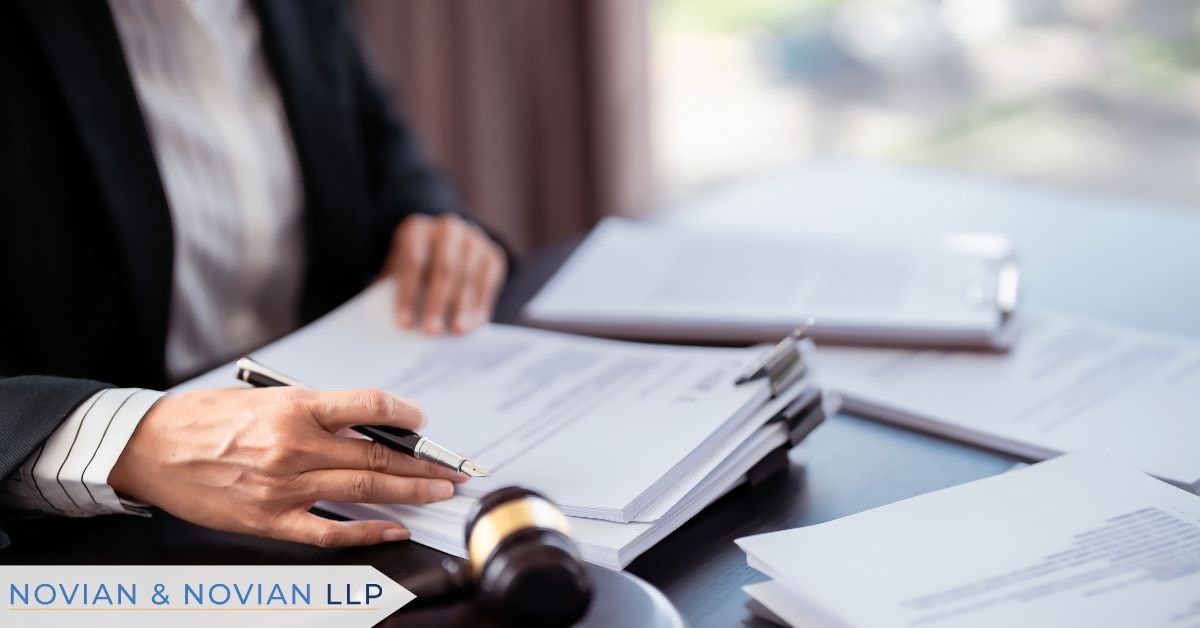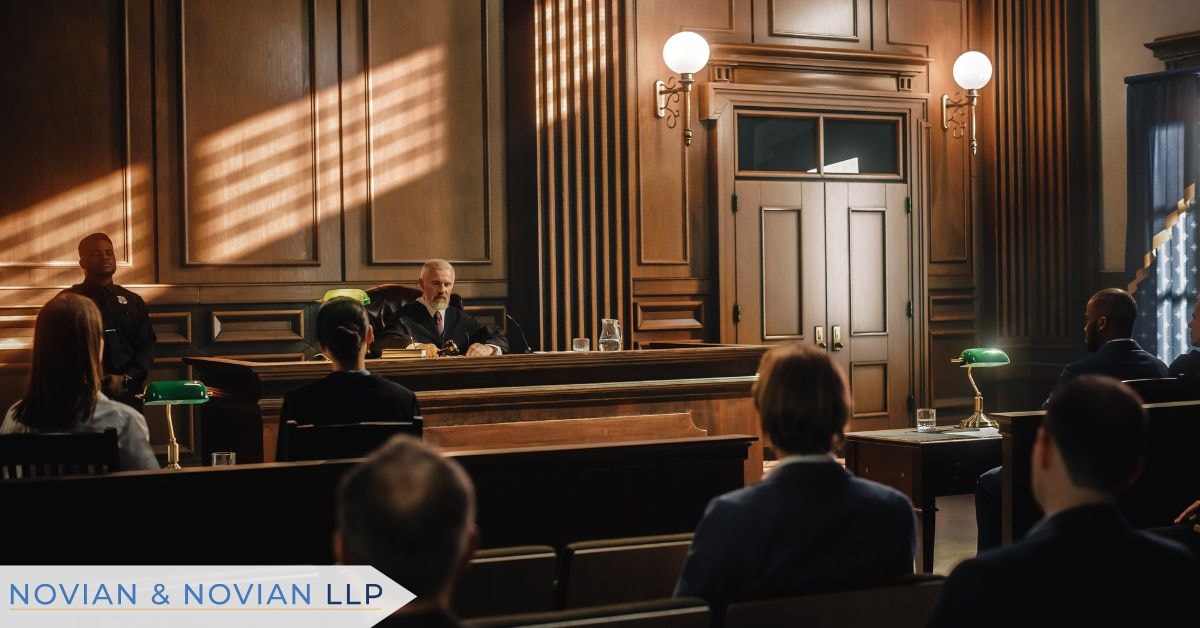
By | Oct 26, 2024 | Catastrophic Injury
Personal injury lawsuits allow individuals who have been harmed due to another party’s negligence to seek compensation for their losses. While necessary, this process can be overwhelming to many plaintiffs due to the legal intricacies and deadlines involved. To ensure your lawsuit gets filed correctly, you must first understand how to file a personal injury lawsuit properly.
To file a personal injury lawsuit, seek immediate medical attention right away, gather evidence to support your case, and consult an experienced personal injury attorney.
If you have been injured due to someone else’s negligence, you should file a personal injury lawsuit. At Novian & Novian, we specialize in California personal injury cases and we have what it takes to handle the legal complexities on your behalf while you focus on your recovery. Schedule a free case evaluation with us now!
This post will give a brief overview of personal injury lawsuits and the direct steps you need to take when filing a personal injury lawsuit. It will also cover the time it takes to complete filing a personal injury lawsuit and tips for strengthening your case.
What Is a Personal Injury Lawsuit?
A personal injury lawsuit is a legal claim filed by an individual (plaintiff) who has been injured due to the negligence or wrongful actions of another party. The goal is to seek compensation for damages such as medical bills, lost wages, pain and suffering, and other related expenses. Personal injury lawsuits are typically designed to hold the at-fault party accountable and help the injured person recover financially from the harm they’ve suffered.
Personal injury cases cover a wide range of situations where someone is harmed due to another’s negligence. Some of the most common types of personal injury cases include car accidents, slip-and-fall injuries, medical malpractice, product liability, and workplace injuries.
When to File a Personal Injury Lawsuit
Filing a personal injury lawsuit is appropriate when you have suffered physical injuries, emotional distress, or financial losses due to someone else’s negligence. If it is evident that another party’s actions or inactions caused your injury, you may have grounds to file a lawsuit.
Similarly, if the injury leads to long-term disability, high medical expenses, or significant life changes, you should and can file a lawsuit. You can also file a personal injury lawsuit when the insurance provider does not offer compensation that covers your medical treatment, lost wages, and other damages.
However, you must know the statute of limitations guiding your case and city before you file a lawsuit. The statute of limitations refers to the legal deadline for filing a personal injury lawsuit. This time limit varies depending on the state or region, and missing it can result in your case being dismissed. For example, in California, the statute of limitations for personal injury cases is two years from the date of injury, while the time limit in New York is three years. But, in Florida, you have four years to file most personal injury claims.
As you think of filing a personal injury lawsuit, remember that proper documentation is helpful to the success of any personal injury claim. This includes keeping records of police reports, medical records, photos and videos, lost wages, and medical bills and expenses.
How to File a Personal Injury Lawsuit?
Filing a personal injury lawsuit can be complex and overwhelming, especially if you’re dealing with medical treatment and recovery at the same time. However, if you follow the steps we will highlight below, the process will be a lot easier, and you will have a successful claim.
Assessing the Validity of Your Claim
Before filing a personal injury case, you should first determine whether your case is valid. Personal injury claims generally revolve around negligence, meaning you must prove that the other party’s failure to act with reasonable care directly caused your injuries.
Factors to consider include negligence, injury severity, and damages. You should check and weigh the financial, emotional, and physical consequences that the injury has caused for you.
Gathering Evidence
Strong evidence is the foundation of any successful personal injury case. Collecting medical records, accident reports, and witness statements will help in proving your injury claim.
As you gather evidence, preserve all documentation, like bills, receipts, and any reports related to your injuries or accidents. You should also take pictures of your physical injuries and the accident scene if possible. Furthermore, document every doctor’s visit, hospital stay, and treatment procedure.
Consulting a Personal Injury Lawyer
Hiring an experienced personal injury attorney is key to navigating the legal process. A personal injury lawyer can evaluate the strength of your case, negotiate with the insurance company, and represent you in court if necessary. The legal expertise provided ensures that you seek maximum compensation for your medical bills, lost wages, and pain and suffering.
At Novian & Novian, we have skilled personal injury attorneys with a proven track record of successfully handling personal injury claims. Their expertise ensures you receive a fair settlement and avoid pitfalls that may reduce your compensation. Schedule a free case evaluation today!
When meeting with an attorney for the first time, ensure that you take along your medical records and bills, accident reports (e.g., police reports for a car accident), and photos and videos related to the incident. If you have any communication with insurance companies, it is also helpful to take it along.
Calculate Your Damages
In personal injury lawsuits, compensation is typically awarded for both economic and non-economic damages. Economic damages include medical bills, lost wages, and property damage, while non-economic damages refer to pain and suffering, emotional distress, and loss of enjoyment of life.
Therefore, work with your attorney to calculate the total compensation you should seek. It is important to take into consideration future medical expenses and ongoing financial impacts.
Filing the Lawsuit
After gathering evidence and assessing your damages, it is time to officially file your personal injury lawsuit. Firstly, you must identify the defendant by correctly naming the at-fault party (defendant) and their insurance company. This is important because sometimes, there may be more than one party liable for your injury, and they all need to be properly identified.
Secondly, file the complaint and summons. These are legal documents that outline your claim and notify the defendant that they are being sued. The filing process is usually done in court.
Thirdly, you have to pay the filing fees when submitting your lawsuit to the court. This varies by state. The cost to file a complaint for a personal injury lawsuit in California typically ranges from $370 to $435, depending on the court and the amount of damages being sought. If the damages are over $25,000, the filing fee is generally around $435.
The Discovery Phase
This is the phase or process where both parties exchange information and gather further evidence. Common discovery methods include interrogatories, depositions, and requests for documents.
Interrogatories involve written questions each side must answer, while depositions are oral testimony taken under oath. There may also be some requests for documents like medical records, photos, and witness statements from both sides. There may also be the involvement of expert witnesses to provide specialized knowledge about medical treatments, injury impacts, or accident reconstruction.
Settlement Negotiations
Most personal injury lawsuits are settled before reaching trial. Settling allows both parties to avoid the uncertainty of a trial.
During settlement negotiations, your personal injury attorney will negotiate with the insurance company to reach a settlement that covers your damages. Your attorney will help you determine whether the offer is fair based on the strength of your case and your total damages. This determines whether to accept or reject a settlement offer.
Pre-Trial Motions
In the pre-trial stage, your attorney may file motions to narrow down issues or even dismiss the case. Common pre-trial motions include motions to dismiss, usually filed if there is insufficient evidence for a valid case. It could also be a motion for summary judgment, which requests the judge to rule in favor of one party without a trial. It is often because the facts are undisputed.
Trial Process
If settlement negotiations fail, your case may proceed to trial. In such a case, you have to prepare for trial, which involves final meetings with your attorney to review all evidence, prepare witnesses, and plan the trial strategy.
The trial usually involves jury selection, opening statements, presenting evidence, cross-examinations, and closing arguments. After both sides present their case, the jury or judge will deliver a verdict. If you win, you may receive a fair settlement amount, and if necessary, the losing party can appeal.
How Much Does It Cost to File a Personal Injury Lawsuit?
Filing a personal injury lawsuit can involve various costs, which may vary depending on the complexity of the case and the jurisdiction. These costs range from $10,000-$150,000. They often cover court fees, attorney fees, expert witness fees, and other expenses such as investigation costs and trial costs.
However, many personal injury attorneys work on a contingency fee basis. This means that you don’t pay any upfront legal fees. Instead, your attorney receives a percentage of the settlement or verdict amount if your case is won. The typical contingency fee ranges from 30% to 40%, depending on the complexity of the case and the agreement you have with your attorney.
What Happens After Winning a Personal Injury Lawsuit?
Once you’ve won your personal injury case, the next step is to receive compensation. If the defendant’s insurance company is responsible for paying, they typically issue a check to cover your awarded damages. In some cases, the defendants themselves may be required to pay. In many cases, the compensation is paid in one lump sum. However, for larger amounts, compensation might be paid over time in installments. Your attorney will ensure that you receive the payment in a timely manner and can help negotiate with the insurance company if any issues arise.
In some cases, the defendant may appeal the verdict, which can delay the payment of your damages. If an appeal is filed, the case will go to a higher court for review. When this happens, your attorney will continue to represent your interests during the appeal process.
Typically, appeals may focus on legal errors during the trial or the amount of compensation awarded. It is important to note that the appeal process can be lengthy. However, your personal injury lawyer will work to resolve it as efficiently as possible.
Factors That Can Affect Your Personal Injury Claim
Several factors can influence the outcome and value of your personal injury claim. One of these is the type of damages you can claim. Your medical treatment costs, lost wages, and pain and suffering all impact your claim and compensation amount.
Another factor that can affect your personal injury claim is comparative fault. Your compensation may be reduced if you are partially at fault for the accident. In states with comparative fault laws, your damages are reduced based on your percentage of fault. For example, in California, if you are found to be 20% at fault, your compensation will be reduced by 20%.
Dealing with the insurance company is also a factor that often comes into play, as insurance companies often try to reduce the payout for personal injury cases. They may dispute liability, question the severity of your injuries, or offer a low settlement. However, an experienced attorney can handle communications with the insurance adjuster and negotiate on your behalf.
Importantly, your attorney is a factor in determining your claim. An experienced personal injury lawyer improves your chances of winning and increases the likelihood of receiving a fair settlement. A skilled personal injury attorney knows how to build a strong case and give expert legal representation. They also have super negotiation skills and understand how to handle settlement negotiations with insurance providers.
How Long Does the Personal Injury Lawsuit Process Take?
The timeline for a personal injury lawsuit can generally take about 6 months to 2 years. It can vary significantly based on several factors, including the complexity of the case, court schedules, and the willingness of both parties to negotiate.
The first stage is usually to file the lawsuit after gathering evidence and preparing your case with your attorney. It takes about 1 to 3 months. Then the discovery phase takes about 6 months to 1 year. Other stages of the process such as pre-trial motions, trial, and post-trial takes about 1 to 6 months respectively.
On the other hand, if either party is dissatisfied with the outcome of the trial, they may choose to file an appeal. The appeals process can significantly extend the timeline of a personal injury lawsuit, often taking several months to years to reach a conclusion. Appeals typically involve a review of the trial court’s proceedings and may result in the case being sent back to trial or a different ruling.
Tips for Strengthening Your Case
To strengthen your case, you must keep detailed records of your injury and recovery. This includes keeping documentation of medical records, progress notes, photos and videos, etc. It also helps to maintain a daily journal to track your pain levels, limitations, and how the injury affects your daily life. This can provide valuable context for your personal injury attorney when discussing your case.
Next, you have to maintain effective communication with your personal injury attorney. This includes being transparent and asking questions. You also have to keep your attorney informed of any new developments regarding your medical treatment or interactions with the insurance company.
It is also important to avoid some common mistakes like social media posts about your injury, recovery, or the lawsuit as insurance adjusters can often monitor social media activity and use your posts against you in court.
Furthermore, do not ignore medical advice. Failing to adhere to medical advice may give the insurance company grounds to dispute your claim.
Additionally, avoid discussing your case with others. It is best to limit conversations about your case to your attorney and trusted individuals. Avoid discussing the details with friends or family, as these conversations may be misinterpreted or disclosed unintentionally.
Need Assistance with a Personal Injury Claim Process?
Filing a personal injury lawsuit can be a complex journey, but it becomes easier when you understand the various steps. It starts with you assessing your claim, gathering evidence, and consulting a personal injury lawyer. You will then work with your lawyer to calculate your damages and file the lawsuit. Your lawyer will handle settlement negotiations or the trial process.
If you’ve been injured and are unsure about how to proceed with your personal injury claim, it is best to seek legal advice. An experienced attorney can guide you through the complexities of the legal process, help you understand your rights, and improve your chances of receiving maximum compensation.
For expert assistance with your personal injury case, contact Novian & Novian. We have expert personal injury lawyers in Los Angeles with over 30 years of experience who will help you get the compensation you deserve. Schedule a free consultation with us today to get started.
Contact Us
Have questions about this post? Novian & Novian is a full service law firm in Los Angeles with clients that span the country. Contact us today for a free consultation.
Contact Us
Have questions about this post? Novian & Novian is a full service law firm in Los Angeles with clients that span the country. Contact us today for a free consultation.




